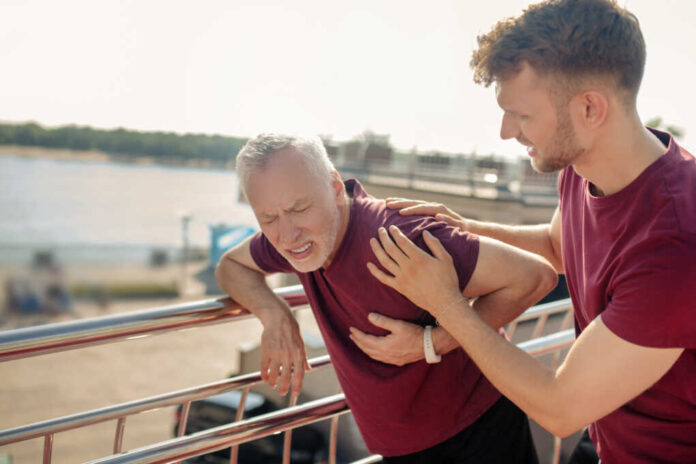
Exercising at the gym is a popular choice for maintaining fitness and well-being, yet for certain individuals, it may pose a risk of a heart attack. While regular exercise generally decreases the likelihood of cardiovascular issues, there are specific considerations to bear in mind.
Let’s talk about the potential risks linked to gym workouts.
Chest Pain
Some people think heart attacks start with solid chest pain, but they can begin with mild discomfort like pressure or squeezing in the chest. This discomfort can come and go and may not feel too severe.
Chest pain happens when the heart doesn’t get enough blood or oxygen. The intensity and type of pain can vary from person to person.
- It might feel like a heavy, crushing sensation or a sharp, burning pain.
- The pain can spread to the neck, arms, stomach, jaw, or upper back.
- Chest pain from angina often comes with activity or emotions and goes away with rest or medicine.
Sometimes, lousy indigestion can also cause chest pain. If you have chest pain that lasts for more than a few minutes, stop exercising and get medical help.
Shortness of Breath
When the heart struggles to pump blood effectively, it can lead to a buildup of fluid in the veins connecting the lungs and the heart. This excess fluid can seep into the lungs, resulting in shortness of breath. This symptom is commonly associated with heart failure. You might experience shortness of breath during physical activity, while resting, or even when lying flat on your back, which might disrupt your sleep.
Fatigue
Feeling tired can mean different things. Sometimes, you just need more rest, but if you’re constantly feeling worn out, it could be a sign of a bigger problem. Pay attention if:
- You suddenly feel very weak.
- You’re too tired to do your normal daily activities.
- You feel much more tired than usual, especially before or during a heart attack, which is common in women.
Coughing or Wheezing
Persistent coughing or wheezing that doesn’t improve can indicate fluid accumulation in your lungs. Additionally, you might cough up mucus that appears pink or bloody.
Swelling in the Legs, Feet, or Ankles
Swelling in your legs, ankles, or feet, where pressing your finger leaves an indentation, could indicate heart failure. However, it’s important to note that kidney or liver issues, weak leg veins, or certain medications, like nifedipine or amlodipine, might also cause this swelling. Additionally, you might experience swelling in your stomach or notice weight gain.
Discomfort in Other Areas Of The Body
Heart problems can make other parts of your body feel weird, not just your chest. You might feel pain or pressure in your arms, back, neck, jaw, or stomach. Sometimes, the discomfort can spread from one area to another, like from your chest to your shoulder or arm.
When to Seek Help
If you are having a heart problem, don’t wait or try to keep going with your workout. Call for help right away. The American Heart Association says to call 911 within a few minutes, no more than five.
During a heart attack, your heart might stop, but emergency responders can help start it again. If you can’t call 911, have someone else drive you to the hospital fast. Don’t drive yourself unless you have to.



















